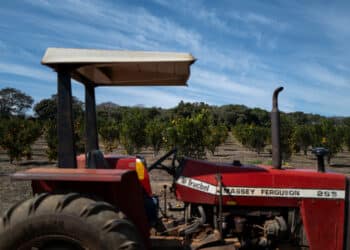Farmer sentiment continues to rise after the pitfalls of 2024, with improved commodity prices and expected subsidies potentially offsetting tariff-related challenges.
Purdue University’s Ag Economy Barometer landed at 152 in February, up 11 points from January and up roughly 73% from a more than eight-year low of 88 in September. The index, released March 4, comprised responses from about 400 farmers and was conducted from Feb. 10 to Feb. 14, before President Donald Trump’s tariffs became imminent.

While the proposed tariffs, some of which have taken effect, are likely to cause the index to dip next month, farmers are confident that subsidies, including the continuation of the 2018 Farm Bill, will mitigate their adverse effects, Michael Langemeier, associate director at the Center for Commercial Agriculture at Purdue University, told Equipment Finance News.
Tariffs “don’t take away some of the positives that led to the higher sentiment to begin with,” he said. “We still have to point to the fact that after the election, the farmers thought the policy environment was going to be more conducive to agriculture production. … There’s some positives that are going to partially offset the threat of tariffs.”
The Index of Future Expectations increased three points to 159 in February. Farm subsidy payments rose 58.1% annually during Trump’s first term, topping $25 billion in 2020, which contributed to the improved outlook, Langemeier said.

Higher commodity prices spark investment
The Index of Current Conditions jumped 28 points to 137. The Farm Capital Investment Index rose 11 points to 59 in February, its highest mark since May 2021.
The increases were partly attributed to higher corn and soybean prices and a strong livestock sector, Langemeier said.
“Beef prices are really high right now, so that industry is doing quite well,” he said. “And that’s a really important industry to U.S. agriculture. … I don’t expect that sentiment for the beef industry to decline as much as it probably will for the crop sector” next month.

Despite some policies supporting the agriculture equipment sector, “most farmers will want to see at least one good earning year and more visibility and confidence in their end markets before engaging in equipment purchases over and above their replacement demand,” Gerrit Marx, chief executive at farm equipment manufacturer CNH Industrial, said during the company’s Feb. 4 earnings call.
Interest rate uncertainty returns
Following a series of Federal Reserve rate cuts at the end of 2024, most equipment finance professionals anticipated a considerably lower-interest rate environment in 2025.
While interest rates are down slightly, the inflationary impact of tariffs could prompt the Fed to pull rates back up, potentially hindering equipment sales and financing activity, Langemeier said.
“We don’t really know what’s going to happen with interest rates,” he said. “That’s going to have a huge impact on machinery because we don’t know what the economy is going to look like. And what the Fed does with interest rates is really going to depend on what the economy looks like. So, it’s just all these unknowns.”
The third annual Equipment Finance Connect at the JW Marriott Nashville on May 14-15, 2025, is the only event for both equipment dealers and finance providers. Learn more and register here.









